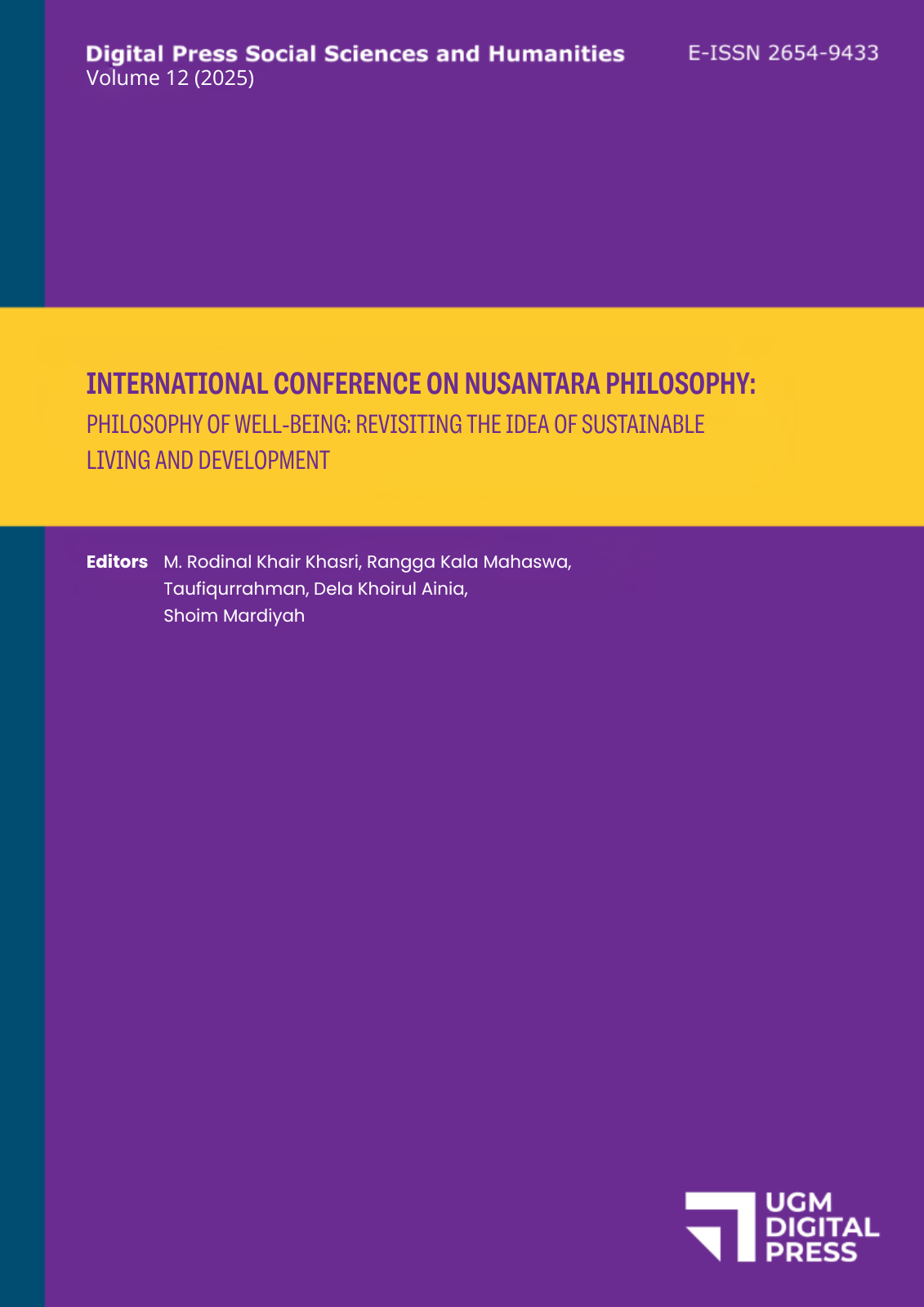Evaluating Franz Magnis-Suseno’s Argument for God's Existence: A Systemic Philosophical Approach
Gigih Saputra
1
, M. Rodinal Khair Khasri
2
1
STIAMAK Barunawati, Surabaya, Indonesia
2
Faculty of Philosophy, Gadjah Mada University, Yogyakarta, Indonesia
Saputragigih369@gmail.com
Abstract
The discourse on the argument for God's existence is one of the philosophical themes in Indonesia, with one of the prominent figures Franz Magnis Suseno. This research is based on a gap in the absence of an in-depthstudy with a new perspective on Magnis's thought. This research aims to provide new insights through a critique and recommendations on Magnis's views concerning cosmological and teleological arguments. The author introduces a new perspective, namely the Cosmo-Teleological System Theory and the Systematic Critique of Atheism Theory. The findings of research about the ambiguity of the deepest nature of causality, the lack of integration between cosmological and teleological arguments, and the insufficient depth in arguments to ascertain the limits beyond the natural world, particularly regarding the possibility of immaterial causal chains in the origins of the universe. Another gap identified is the notion that the Absolute does not necessarily imply God, which can lead to the implication that the Absolute could be something other than God. Magnis's views on teleological argument, specifically the inconsistency in the use of principles of directionality and randomness. Magnis still permits randomness, given the possibility of Multiverses, and posits that our universe might be the result of a random combination of these Multiverses. Orderliness presupposes a final purpose, whereas randomness does not. Absence of purpose results in the lack of unified direction among the components of a system, which in turn leads to the absence of a cyclical pattern, a hallmark of an orderly system, leaving only chaos.
Keywords
cosmological, teleological, systematic philosophy, Indonesia
References
Bakker, A., & Zubair, A. C. (1990). Metodologi Penelitian Filsafat. Yogyakarta: Kanisius.
Barbosa, J. (2022). Why Big Bang is so Accepted and Popular: Some Contributions of a Thematic Analysis. Axiomathes, 32(3), 433–458. https://doi.org/10.1007/s10516-021-09533-y
Boulding, J. (2021). The Multiverse and Participatory Methaphysics. Cambridge: University of Cambridge.
Chan, M. H. (2019). Is the History of our Universe Finite? Theology and Science, 17(2), 248–256. https://doi.org/10.1080/14746700.2019.1596314
Craig, W. L. (2016). FIVE ARGUMENTS FOR GOD: The New Atheism and the Case for the Existence of God. London: Christian Evidence Society.
Hawking, S. (2013). Sejarah Singkat Waktu. Jakarta: PT Gramedia Pustaka Utama.
Ijjas, A., & Steinhardt, P. J. (2018). Bouncing cosmology made simple. Classical and Quantum Gravity, 35. Retrieved from https://api.semanticscholar.org/CorpusID:119270892
Khasri, M. R. K. (2023). Status Ontologis Objek Semantik Ketuhanan dalam Perspektif Teori Objek Alexius Meinong. Universitas Gadjah Mada, Yogyakarta.
Kohli, I. S., & Haslam, M. C. (2015). Mathematical issues in eternal inflation. Classical and Quantum Gravity, 32(7), 075001. https://doi.org/10.1088/0264-9381/32/7/075001
Kontou, E.-A., & Olum, K. D. (2021). Energy conditions allow eternal inflation. Journal of Cosmology and Astroparticle Physics, 2021(03), 097. https://doi.org/10.1088/1475-7516/2021/03/097
Kreeft, P. (2008). Because God Is Real. San Fransisco: Ignatius Press
Linde, A. (2017). A Brief History of the Multiverse. Reports on Progress Physics, 80(2).
Linford, D. (2022). Big Bounce or Double Bang? A Reply to Craig and Sinclair on the Interpretation of Bounce Cosmologies. Erkenntnis, 87(4), 1849–1871. https://doi.org/10.1007/s10670-020-00278-5
Magnis-Suseno, F. (2006). Menalar Tuhan. Yogyakarta: PT Kanisius.
Sanchez-Sabate, R. (2021). Contemporary Grammars of Meaning Creation: Scientific Creationism and New Atheism. Religions, Vol. 12. https://doi.org/10.3390/rel12030166
Saputra, G. (2020). Zakir Naik’s Concept of Divinity-Cosmology: Criticim-Reconstruction of the Modern Natural - Cosmological Theology. Teosofi: Jurnal Tasawwuf Dan Pemikiran Islam, 10(2), 326–327.
Saputra, G. (2023). Rekonstruksi Teori Sistem Argumen Kosmo-Teleologi dan Kritik Sistemik atas Ateisme. UIN Sunan Ampel.
2 Faculty of Philosophy, Gadjah Mada University, Yogyakarta, Indonesia
Saputragigih369@gmail.com
Abstract
Keywords
cosmological, teleological, systematic philosophy, IndonesiaReferences
Bakker, A., & Zubair, A. C. (1990). Metodologi Penelitian Filsafat. Yogyakarta: Kanisius.
Barbosa, J. (2022). Why Big Bang is so Accepted and Popular: Some Contributions of a Thematic Analysis. Axiomathes, 32(3), 433–458. https://doi.org/10.1007/s10516-021-09533-y
Boulding, J. (2021). The Multiverse and Participatory Methaphysics. Cambridge: University of Cambridge.
Chan, M. H. (2019). Is the History of our Universe Finite? Theology and Science, 17(2), 248–256. https://doi.org/10.1080/14746700.2019.1596314
Craig, W. L. (2016). FIVE ARGUMENTS FOR GOD: The New Atheism and the Case for the Existence of God. London: Christian Evidence Society.
Hawking, S. (2013). Sejarah Singkat Waktu. Jakarta: PT Gramedia Pustaka Utama.
Ijjas, A., & Steinhardt, P. J. (2018). Bouncing cosmology made simple. Classical and Quantum Gravity, 35. Retrieved from https://api.semanticscholar.org/CorpusID:119270892
Khasri, M. R. K. (2023). Status Ontologis Objek Semantik Ketuhanan dalam Perspektif Teori Objek Alexius Meinong. Universitas Gadjah Mada, Yogyakarta.
Kohli, I. S., & Haslam, M. C. (2015). Mathematical issues in eternal inflation. Classical and Quantum Gravity, 32(7), 075001. https://doi.org/10.1088/0264-9381/32/7/075001
Kontou, E.-A., & Olum, K. D. (2021). Energy conditions allow eternal inflation. Journal of Cosmology and Astroparticle Physics, 2021(03), 097. https://doi.org/10.1088/1475-7516/2021/03/097
Kreeft, P. (2008). Because God Is Real. San Fransisco: Ignatius Press
Linde, A. (2017). A Brief History of the Multiverse. Reports on Progress Physics, 80(2).
Linford, D. (2022). Big Bounce or Double Bang? A Reply to Craig and Sinclair on the Interpretation of Bounce Cosmologies. Erkenntnis, 87(4), 1849–1871. https://doi.org/10.1007/s10670-020-00278-5
Magnis-Suseno, F. (2006). Menalar Tuhan. Yogyakarta: PT Kanisius.
Sanchez-Sabate, R. (2021). Contemporary Grammars of Meaning Creation: Scientific Creationism and New Atheism. Religions, Vol. 12. https://doi.org/10.3390/rel12030166
Saputra, G. (2020). Zakir Naik’s Concept of Divinity-Cosmology: Criticim-Reconstruction of the Modern Natural - Cosmological Theology. Teosofi: Jurnal Tasawwuf Dan Pemikiran Islam, 10(2), 326–327.
Saputra, G. (2023). Rekonstruksi Teori Sistem Argumen Kosmo-Teleologi dan Kritik Sistemik atas Ateisme. UIN Sunan Ampel.

